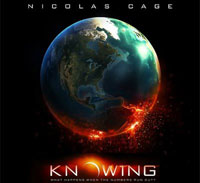I don't want this to be another movie review, but I just finished watching a very thought provoking film. I rented Knowing for the evening. The film combined elements of the rapture, prophecy, aliens, and end of the world apocalyptic views. I have to admit that it was probably one of the best films I have seen that put events into a modern realistic view. What really caught my attention though is the last seen in the movie. The director uses a symbol that I feel caries extraordinary significance especially in the context of revelation. He inserts a fantastic tree of light. The imagery was striking, especially its location in a large and spacious field of wheat. Wheat is a symbol of life. It is also a symbol of the bread of life, the lord of the harvest, The Christ.
The tree is a symbol that is familiar to many cultures. It is often a heavenly symbol and also depicts life. What is significant to the Latter-day saint faith is that this symbol goes much further than the typically tree of life found in the book of Genesis. The tree is found in the Book of Mormon as another symbol of The Christ, the master of life, and the fruit of the tree as the gospel of Christ. Partaking of the fruit represents a oneness with Christ and an acceptance of him. I thought it a powerful note to end the film on and turned to the directors commentary and special features to try and determine the real intent of the director. I was disappointed in that the director made no reference to the symbolism of the tree. He did, however, express his intent in making the film. He was expressing the inevitable end of mankind and the need to be reconciled with death. He spoke of the need for each of us to leave something behind as a kind of a memorial or legacy to our life. Looking back on the film I can see how he used many symbols throughout culture, and took special care to lead the audience with these symbols from a sense of anxiety on to a sense of peace and fulfillment even after the total destruction of the entire world!
I then proceeded to view a special commentary on apocalyptic views prepared to accompany the film. The commentaries included many professors, psychologists, and authors, all expressing their views on “man's infatuation with the end of the world”. They all spoke authoritatively. However, as I listened to them speak, on this particularly delicate subject, I noticed something. There words, though they sounded informed, were very hollow. They spent a lot of time trying to analyze mankind as a species, and failed to express any kind of meaningful insight. It wasn't just what they were saying, it was also how they were saying it. All of the optimism expressed was that mankind will eventually progress so far that he will be able to save himself. It sounds great but as they spoke all feeling seemed to leave them. It was as though they where grasping for something, some tangible insight that just wasn't there. I felt that they were looking for their own assurance but for their total lack of faith in a power greater than themselves there was no assurance. They could speak authoritatively about the age of the earth and sun, as though they had actually been around to time it, but when it comes to matters of spirituality they act as though no gods exist. Any reference to deities is strictly the invention of man. Yet, I wonder if these philosophers of men have taken time to truly think about why it is these symbols stir so much emotion in men and have managed to be perpetuated through nearly every generation.
The big what if- What if there is a God?

